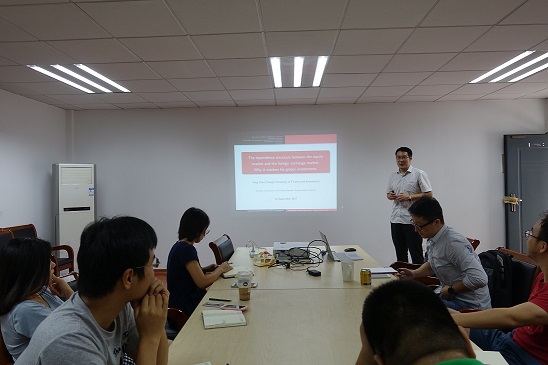September 19, 2017 2:30 PM -4:00 PM, in weiyu 117, PhD., Zhao Yang from Jiangxi University came to the Institute of Economics and Finance of our school to share his own research results on study of the relationship between stock and foreign exchange :The dependence structure between the equity market and the foreign exchange market: Why it matters for global investments .
At the meeting, Dr. Zhao put forward two questions about the motivation and purpose of studying this topic. Then he described the reasons and methods of selecting Copula model and stated the three test ways to compare the developed country market and the emerging market environment to get the explanations of Return chasing effects and Portfolio rebalancing effects. Dr. Huang Ju of our college raised the question of why the markets of developed countries do not include the United States, Dr. Yin Ruchang coexisted on whether the two benefits coexisted in the markets of other countries. Dr. Liu LanLan put forward problems on whether we should select data in the same period or adopting the method of leading and lagging. Dr. Zhao Yang then answered one by one.
In the ensuing sharing, Dr. Zhao Yang followed the recommendations of Cross-market Risk Management, Optimal Asset Allocation, Financial Crisis and Crisis and Post-crisis Analysis) and other problems made his own interpretation. And then our Institute teachers discussed on the problems about how to understand management fee, will the government intervention have a impact on market and so on .
Finally, Dr. Zhao's concluded that contempt for disparate structures can lead to significant economic costs in risk management, and international investors can gain greater returns from diversified venture capital in the context of such dependent structures. In addition, Europe and the United States have been gradually reducing the impact brought about by the crisis and making the entire financial market more stable through persisted and effective market supervision. However, due to limited regulatory capacity in emerging markets, they still can’t completely eliminate the impact of the crisis transmitted from Europe and the United States. Therefore, the risk posed by such a dependency structure between the two markets persists in the post-crisis era that deserves the close attention of global investors.

